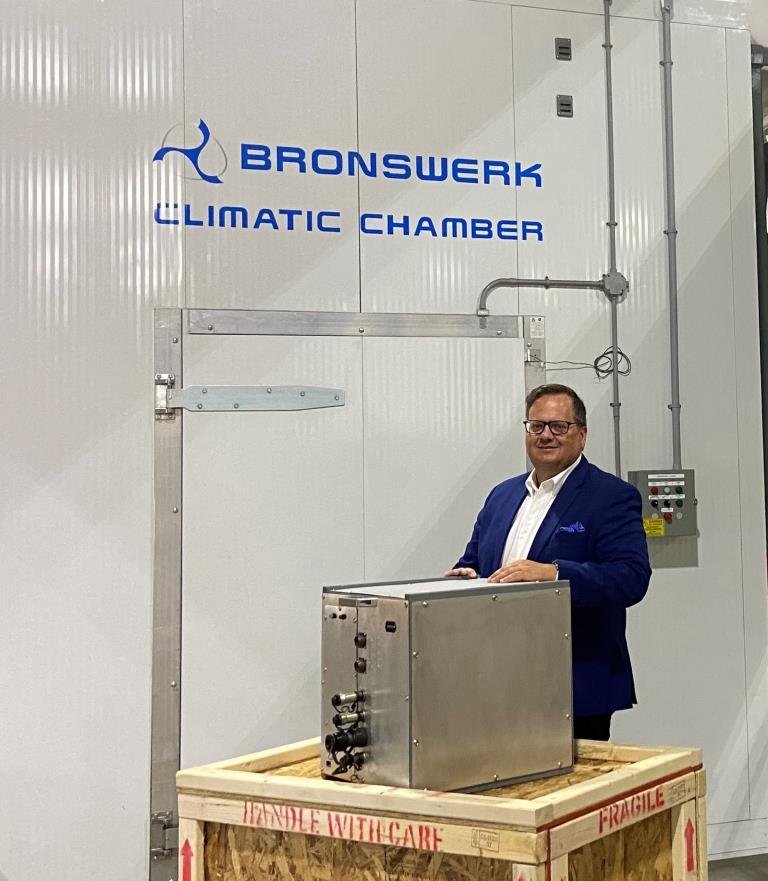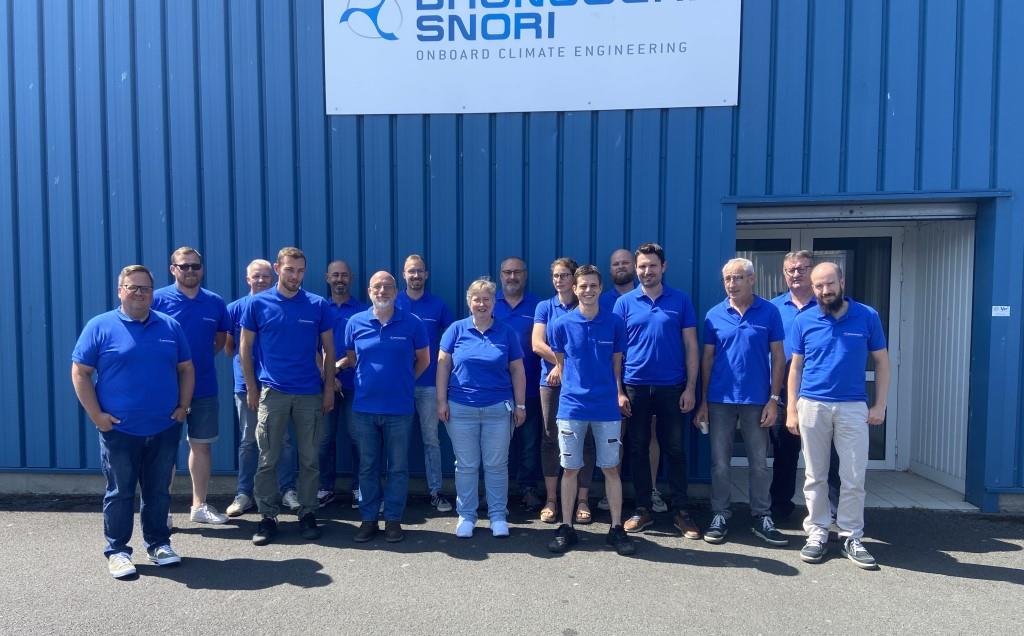NAVAL SYSTEMS - Bronswerk Group
MY MARC MONTGOMERY
Ready, Aye, Ready
As a global leader in the design, fabrication, and installation of naval HVAC-R systems, Bronswerk Group is ready to put decades of expertise towards Canada’s future submarines.
 It may be moving slowly but at least it's moving. Although nothing official has come from the government, the Royal Canadian Navy (RCN) has begun research for the replacement of its 1980's vintage submarine fleet, acquired from Britain in 1998. The current Victoria-class modernization (VCM) program is designed to keep the submarines in-service until their expected decommissioning sometime in the mid-to-late 2030's.
It may be moving slowly but at least it's moving. Although nothing official has come from the government, the Royal Canadian Navy (RCN) has begun research for the replacement of its 1980's vintage submarine fleet, acquired from Britain in 1998. The current Victoria-class modernization (VCM) program is designed to keep the submarines in-service until their expected decommissioning sometime in the mid-to-late 2030's.
July 2021 saw the RCN create the Canadian Patrol Submarine Program (CPSP) to research procurement options for the next generation of submarines. This past April, the RCN issued a release indicating its interest in acquiring eight to twelve new submarines at an estimated cost of $60 billion.
"The time has come for Canada to understand and embrace the important and undeniable linkage of seapower to its national interests. Notwithstanding the ongoing investments in both a domestic shipbuilding capacity and the recapitalization of the bulk of Canada’s surface fleet, a significant component of a balanced fleet is absent from the current plan. (...) Canada must seriously examine the need for a continued and indeed enhanced submarine capability," said VAdm (Ret'd) Mark Norman in a 2021 MacDonald-Laurier Institute publication which assessed the requirements and options for Canada’s future submarine force.
Whether purchased abroad or built here under licence, Canada's Bronswerk Group – now recognized internationally as specialists in design, fabrication, and installation of naval HVAC-R systems – is ready to put decades of expertise towards any new program such as CPSP.
At a one-day conference titled ‘Canadian ASW in the Future Strategic Environment’, organized by the Canadian Global Affairs Institute, General Wayne Eyre, Chief of the Defence Staff noted, “We are engaged in a profound struggle with freedom, democracy, and the rule of law on one side, and authoritarian oppression on the other. Both adversaries are pursuing strategic advantage on and below the surface of the world's oceans, including in the Arctic, and this includes increasing their inventory of submarines."
At the same conference, Jennifer Parker, a Deputy Director Defence of The Australian Strategic Policy Institute said, "China has about 12 nuclear submarines at the moment and is expected to probably have more than double by 2040. China now has continuous ‘at sea’ deterrence."
Allied navies are also busy beefing up submarine programs. The U.S., U.K., and Australia have signed a deal (AUKUS) for various security exchanges and cooperation, which included plans to supply Australia with several nuclear subs.
Britain, France, Holland, and many other countries are also in the development and refit process and it is Bronswerk Group that has subcontracts in virtually all of them.
Based on an excellent reputation stemming initially from the National Shipbuilding Strategy (NSS) and all the varied ships in that program, Bronswerk Group has grown from relatively humble beginnings to become one of the world's major suppliers of naval/marine HVAC-R systems. Recognized for innovation, reliability and quality of installations and in-service support, this led to expansion with offices in Turkey, the U.S., Australia, the U.K, and more recently, France and Singapore.
SNORI ACQUISITION 
In 2018 Bronswerk Group further expanded its marine naval capabilities with the acquisition of France's Société Normande de Réfrigération Industrielle(SNORI) a firm with 38 years of naval experience in HVAC-R with a particular focus in submarine applications with chillers, AC, cold rooms, radar coolers, in both nuclear and conventional subs, along with various specialized ships of the French Navy.
With the acquisition of SNORI, Bronswerk Group is combining its Canadian and European experience to become a global leader. The company is now involved with France’s Naval Group and Spain's Navantia in developing systems for the Scorpene-class conventional and AIP attack variant submarines. The company is also involved in France's Barracuda-classproject for six of the nuclear subs with conventional variations being on offer to other navies, including Canada.
Bronswerk Group has also begun working with Britain's Submersible Ship Nuclear Replacement (SSNR) program with the design named SSN-AUKUS. There is also ongoing involvement with Britain's nuclear deterrent Dreadnought-class subs. There have also been serious discussions with other players in the submarine market for Canadian and international programs.
By combining North American and European expertise Bronswerk Group CEO, Francis Fontaine, told CDR "We are not only gaining new experience in submarine applications, but we are getting new work with French and other navies’ surface combatant ships, while growing our experience across all naval applications."
INNOVATION
One of the many benefits Bronswerk is bringing to both new builds and refits, such as the Royal Netherlands Navy’s Walrus-class submarine refit, is their innovative patented ‘Cube’ technology, a quick-connect, plug and play, water cooled condensing unit for marine applications. Extremely compact (18”x18”x18”) it can be carried by two people through narrow ship passages, and easily replaced with a spare should any part fail. The CUBE can maintain a refrigerated space at any temperature from -20°C to 8°C allowing unprecedented flexibility in food storage onboard ships. Ultra efficient space saving designs such as the CUBE have made the Canadian company a recognized leader in this field.
Another recent innovation is Bronswerk's ‘Pier Central’, a unique dockside HVAC-R unit that replaces on board systems while ships are in port. Easily connected, a ship’s systems can by shut down to preserve their service life.
THE HUMAN TOUCH
Fontaine goes on to say that excellence in product is not enough. “We continue to win market share from incumbents with 30 or 40 years in their shipyards because people appreciate the way Bronswerk functions, our structure, commitment, and dedication,” he told CDR. “It's the Canadian touch, we keep things simple without levels of corporate bureaucracy. Clients know I'm easily accessible if there are questions, although that almost never happens because our people know what they're doing. It's also our flexibility to deal with requirements and resolve issues quickly. We create an environment where staff want to stay and clients appreciate that the people they deal with at the beginning of a project will be the same ones for the duration. It’s a personal connection".
ALSCOTT ACQUISITION
Fontaine notes that the acquisition of Canada's Alscott Air Systems, with its reputation for cooling systems in the renewable energy field, has actually increased exposure to Bronswerk capabilities and excellent record in both the U.S and Singapore. This has led to high level discussions with U.S. naval officials regarding future projects with surface combatant vessels. The Singapore base is being used as a hub to gain access to Asian markets, including Philippine and Malaysian shipyards.
ITB & VALUE PROPOSITION
While nothing official has been announced by the Canadian government regarding new submarines, several possibilities are available. Although foreign designs have often been licence-built in Canada, Fontaine notes that even if eventual subs are built abroad, Canada would benefit from Bronswerk Group's many contacts and contracts with design technology and components being fabricated in Canada by Canadians, as well as with eventual ISS of the systems here and abroad.
As a final note, Fontaine proudly told CDR,"It was our success with the NSS that helped to position us worldwide, so it's actually quite exciting for us to see that growth abroad and in new expertise that we can bring back home".
Marc Montgomery is a Regular CDR Contributor


